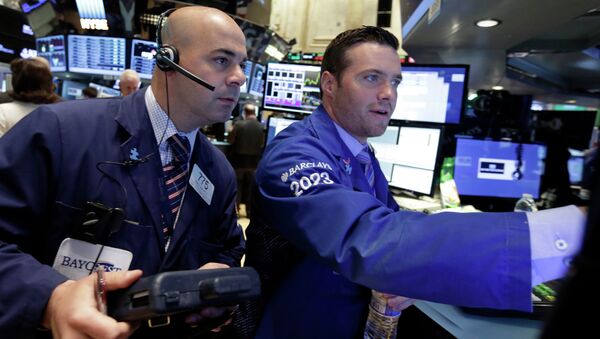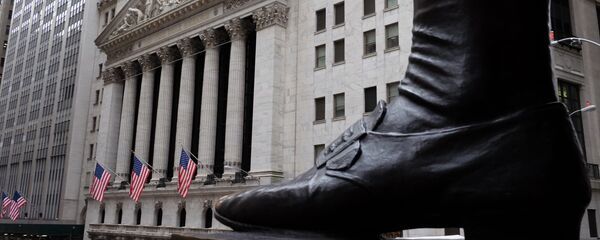Kristian Rouz — Thursday's trading on Wall Street ended with major indices having edged slightly up amidst the absence of explicit factors to either drive a rally or trigger a selloff. The last few days saw the release of a host of mixed macroeconomic data and the US Fed's lack of decisiveness on policy matters, and investors are prone to buy stocks as there's no legitimate reason to sell.
As the uncertainty lingers, America's financials are seemingly outpacing expansion in the real economy, threatening a new stock market bubble. In order to stave off the possibly hazardous developments, the regulative authority has to either spur the real economy by giving a clear sign that the unconventional ultra-easy monetary policies will stay awhile more, or to curb the financial markets by a sooner wrap-up of the accommodative policies and a return to monetary normality.
America's stock markets are just a step away from reaching the so-called ‘trifecta', an occurrence of all the three indices hitting their fresh record highest on the same day, also an event not seen since the year 1999.
The main driving force behind Wall Street this week has been many US enterprises buying their own stock, thus increasing their capitalization. America's economy is preparing for the imminent tightening of monetary conditions, which will be accompanied with random, sometimes significant, losses in the stock market, as a less affordable credit liquidity environment will test the strength of the corporate sector.
On Thursday the mid-May unemployment data arrived, showing a 10,000 increase in the number of people having lost their job for the first time, to some 274,000 people, seasonally-adjusted. This is still just near the 15-year low, so such a disappointment is not that a bad sign after all.
US manufacturing sentiment declined in May, meaning factories have not rebounded from the sluggish Q1. Chicago Federal Reserve Bank released its measure of the US growth in April on Thursday, having noted that despite the economy is underperforming compared to previous forecast, it was still doing better in April than just a month prior to that.
As the US official unemployment stands at 5.4%, now's the point where inflation will start to rise naturally, propelling the overall economic growth. However, at this point, the economy is barely moving, awaiting a decisive policy action. But Washington is idling.
More US macro data has been released overnight, to an even greater disappointment of the real economy, and, probably, a good sign for stocks. Existing houses sales, manufacturing and manufacturing in the Mid-Atlantic region have all underperformed by mid-May against previous estimates.
Yields on US governmental bonds, the Treasuries, fell after the last portion of data arrived, dragging the US dollar down. The euro rose to $1.1140, and the dollar dipped to 120.79 yen after a five-day strengthening.
Consequently, the US Fed's cautious approach will result in a very moderate economic expansion in the US, and the dollar-denominated liquidity will remain cheap for some more time. For the rest of world this is only a temporary relief, while the Eurozone and Japan are less competitive when the dollar is cheap.





